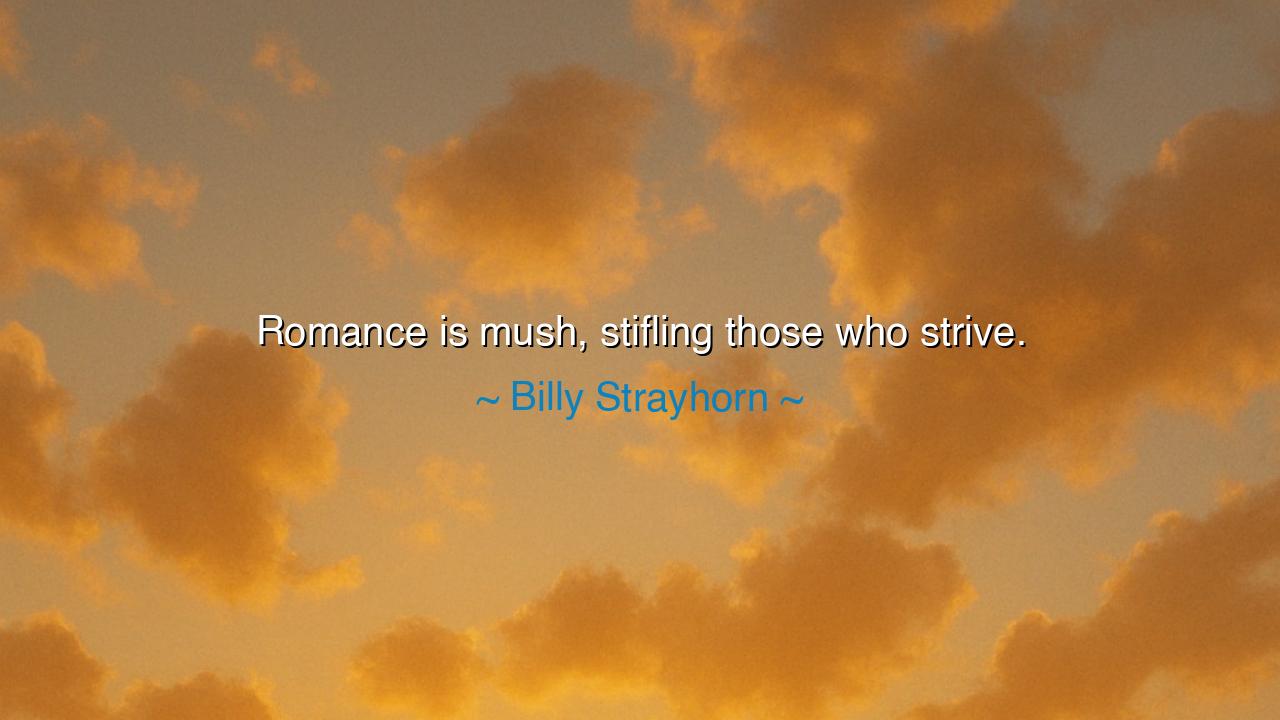
Romance is mush, stifling those who strive.






The words of Billy Strayhorn strike with the sharpness of steel: “Romance is mush, stifling those who strive.” In this declaration, the composer, a man of discipline and brilliance, casts aside the sentimental illusions of the heart. He warns that romance, when indulged as fantasy and weakness, can become a trap—a soft mire into which the feet of the ambitious sink. To him, it is not the fierce devotion of love that empowers, but the cloying haze of sentimentality that restrains the soul from its higher callings.
The ancients too spoke of such danger. They distinguished between the eros that enflames the spirit toward greatness, and the indulgence in idle longing, which leaves men weak and distracted. For the warrior, the statesman, the artist—too much surrender to emotional softness could unravel resolve. Strayhorn, who lived with intensity in the world of music, understood that to strive, to labor for excellence, requires clarity of mind and strength of will. Mush, as he calls it, is the opposite: a fog that clouds the vision, a sweetness that dulls the blade.
Consider the story of Alexander the Great. He wept when his beloved Hephaestion died, yet he did not allow grief to consume him beyond measure. Had he surrendered fully to despair, his conquests would have withered, and his empire lost. Instead, he harnessed his sorrow into action, dedicating victories and monuments in his friend’s name. This balance is the wisdom Strayhorn urges: beware the excess of romance that makes one linger too long in softness, for it can destroy the path of destiny.
Strayhorn’s own life reveals the truth of his words. Working alongside Duke Ellington, he poured his energy into creation, producing works of genius that demanded unrelenting focus. In the world of jazz, where discipline met improvisation, there was no room for indulgence in sentimentality that weakened his striving. Romance—when reduced to sweet distraction—was for him a danger to the fire of creation. He saw too many who were consumed by longing and love’s illusions, losing the very power that could have lifted them to greatness.
Yet his words are not a condemnation of love itself, but of its distortion. For love in its truest form strengthens and uplifts, but love reduced to mush weakens. The lesson he offers is not to shun affection, but to guard against drowning in it, to distinguish between passion that fuels the soul and sentiment that suffocates it. He calls us to vigilance: do not let romance become the chain that binds your wings.
The lesson is clear: if you strive, if you pursue greatness, you must master your heart as well as your hands. Cherish love, but do not be enslaved by it. Allow it to inspire you, but never to smother you. The one who keeps balance will rise higher, while the one who yields fully to mush will be left behind.
Therefore, let all who hear these words take action: examine the loves and longings of your life. Ask whether they sharpen your purpose or dull it. If they are fire, guard them. If they are fog, cut them away. For Strayhorn’s wisdom is as old as time: romance that strengthens is a gift, but romance that stifles those who strive is a chain of velvet—soft to the touch, but deadly to the soul’s ascent.
Thus we learn that the highest path is not without love, but above sentimentality. To strive is to rise, and to rise, one must walk free of the mire. So guard your strength, children of tomorrow, and let no mush of romance weaken your climb toward greatness.






AAdministratorAdministrator
Welcome, honored guests. Please leave a comment, we will respond soon